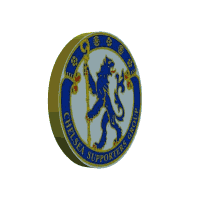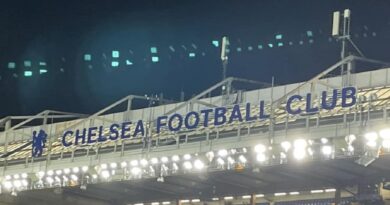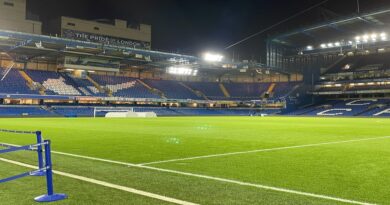In interview: Zsolt Low
From the official Chelsea FC website:
In the fourth and final part of our interview series finding out more about Thomas Tuchel’s backroom staff, the spotlight falls on Zsolt Low, the Hungarian who has not only worked with the Chelsea boss but also played under him.
Now 43, Low was coming to the end of his playing days at Mainz just as Tuchel was taking his first steps in management. Unlike Arno Michels and Benny Weber, the other two coaches who followed Tuchel from PSG to Stamford Bridge, Zsolt and Tuchel’s coaching alliance would not begin at Mainz, although not for the want of trying.
Instead, Low foraged his own highly successful coaching career with the Red Bull Group in Salzburg and then Leipzig, under the stewardship of his former Hoffenheim boss, Ralf Rangnick.
‘Jogi’ would eventually reconnect with Tuchel when he took over at PSG, and he has been at his side ever since. Here he opens up on his journey from player to coach, his football philosophy and the toughest test of his life so far…
Jogi, tell us about the start of your footballing journey in communist Hungary…
‘At that time in my country being a sportsperson was a very high-ranking position. Football was very popular. We were a normal family in Hungary living in a 10th-floor flat. There were not a lot of things to do apart from sport. We played football all day long.
‘I played school football and one of the biggest clubs in Hungary, Ujpest, came to this tournament searching for talent. In ’88, when I was nine years old, they picked me. I was the happiest and proudest kid in the whole world.
‘My parents and my brother protected me. Football had been in my family, and in my country. I spent 14 years at Ujpest, went through the whole youth system and got into the first team squad in 96/97. I played my first game in 1998.’
Low, a left-back, joined Energie Cottbus in the Bundesliga in 2002, and made his debut for the Hungary national team shortly afterwards. After a short and unsuccessful spell at Hansa Rostock, he signed for Hoffenheim in 2006. Low takes up the story.
‘They were starting a new project in the Third Division with a vision to go to the First Division. It was a heavy decision for me. Should I go there? It was Ralf Rangnick who was in charge, bringing some of the best people in German football as sports psychologists, assistant coaches, manager, and he built the whole club. New training centre, new facilities, new stadium, new players.
‘He had two talks with me and was absolutely clear with his vision. I received a lot of criticism for dropping to the third league. I was a national team player for Hungary. Nobody understood it, but it was my decision. Fortunately, we went up to the Second Division after the first year, and then we went straight up to the First Division. People admitted it might have been the right decision!’
Now in the Bundesliga, Hoffenheim led Bayern Munich at the winter break, but Low found playing time hard to come by. He dropped down a league to sign for Mainz in January 2009, and they swiftly got promoted and appointed a new boss, a 35-year-old by the name of Thomas Tuchel…
‘I did two years with Thomas. I finished my career in 2011. Thomas asked me to stay with him as a half-player, half-coach. To still train with the team, but to make the connection between the players and the coaching staff. I was absolutely happy with it, but we couldn’t agree with the club. This role didn’t exist at this time.
‘It wasn’t the biggest friendship when I was a player, we also had conflict! Sometimes I had the feeling I had to play, sometimes he had the feeling I didn’t have to play, it wasn’t like everything was pink and super nice!
‘We went on a different way, but we respected each other. I knew he is a very big coach and a nice person, and he could be important in my life. He also knew I could be important for him one day.
‘As a player I was always interested to know what I had to do and why I had to do it. I wanted to watch all the time behind the scenes and understand the coaches: why they handled something they way they did, what they really wanted. I was just interested as a footballer, not because I wanted to be a coach then.
‘I went back to Hungary with a heavy heart because I really wanted to work with Thomas, and Thomas wanted to work with me so we could start our careers together.’
When did you get the nickname Jogi?
‘When I first moved to Germany the German players asked what they could call me. I said Zsolt [roughly Gerholt with a soft g]. It was very difficult for them! They tried but could never get it right! Then they saw my name was Low, very similar to the national team coach. From this moment, I started with the nickname Jogi, and it’s come through my whole life. I am proud of it, Jogi Low is a great German coach.’
After nine months back home in Hungary spending time with family and friends, Low got another call from an ‘insistent’ Rangnick, urging him to join him as he embarked on a new project with Red Bull…
‘I had no coaching licence. I didn’t know what I wanted to do – sporting director, technical director, coach – but he said just come to me, work with me and we will figure out where your talent is and what you can do.
‘Just like when I joined Hoffenheim, he was very nice but aggressive in a good way. Very clear, very direct, very impressive. Two days later I was sitting in Salzburg!’
It was clear Low’s future lay in coaching, and between 2012 and 2018 he helped various Red Bull teams make great strides forward. First he guided RB Salzburg’s ‘farm’ team to promotion and helped them stabilise and flourish in the second tier. Rangnick moved him to the main RB Salzburg team as assistant. They won the league and the cup, and broke records in the Champions League.
Next stop, in the summer of 2015, was Leipzig, working directly with Rangnick. They got promoted immediately and then made waves in the Bundesliga, with Low now working alongside Ralph Hassenhuttl. In 2018 came the chance to work with Tuchel again…
‘After six years with Red Bull I had the feeling I had learned everything, I had given everything and lived high-intensity years with all the pressure to constantly go one step better, and still during those six years the contact with Thomas never broke. We were always trying to find the way to come together. We talked to each other a lot.
‘He saw I went my own way and could be very successful. In these six years I did my B Licence, my A Licence and my Pro Licence. I did it on the side and it was very difficult.
‘He went to Dortmund but it wasn’t the right moment, so we waited. After he had one year off, Thomas went to Paris Saint-Germain. I had a contract with Red Bull and they offered me other possibilities to try and keep me. They fought hard but in the end, they let me go. Paris paid the highest amount ever for an assistant coach, 1.5 million euros.
‘I had the feeling deep inside I wanted to learn and see something new. Thomas’s ideas of football and my ideas of football mixing could be something unique.’
And what were your respective ideas of football?
‘The whole Red Bull project was based on very high intensity football without the ball. It was about very high, aggressive pressing and counter-pressing, with high ball recoveries, with high ball wins, and fast attacks. It was a little bit like Liverpool now. Ralf Rangnick and Klopp had similar visions.
‘Thomas was more the coach who likes to play the game with the ball, with a lot of passes, with build-up and control of the ball. It was more Pep Guardiola football, and the other one was more Jurgen Klopp football.
‘The idea was to bring these two together and make it unique.’
When you reconnected with Tuchel in 2018, was it the same Tuchel you last worked with seven years earlier?
‘He had changed a little bit, he had become a highly experienced coach, but in his way of thinking about football and away from the pitch, nothing had changed. It was the same smile, the same nice person for me from the first moment. We felt the same connection.
‘It was for sure not easy in the first months to understand each other. It was not only Thomas who had been very experienced in his own ideas. I too had six years with my own ideas. It wasn’t easy to bring these two together.
‘I had very high responsibility in my six years with Red Bull. I was a little bit more than an assistant coach, I had to take care of the transfer period, of players, meetings, a lot more than coaching.
‘I had to find my role in the new team. Arno was there, Benny was also there, and I had to find my space in the whole construct without disturbing them, but still adding something and still having a clear idea of what I want and how I could help.
‘It took time. For sure we had a big fight about how we wanted to play and how we create a match plan together, but we could learn a lot from each other.
‘We had an important time in Paris together, it was a big experience for Thomas, and his older staff, and me also. It was another level of football – working with such big stars is a different skill. We learned a lot and became better coaches for it.’
Chelsea came calling in January last year…
‘We were very happy to be here. We are in the right place. It’s a big club, a well-organised club and we work with very nice and competent people. It could never happen in football that you could arrive in January and win the Champions League final in May if the whole club didn’t have a good structure and give us good support.
‘From the personal side, it was the hardest time in my life, and I think I can talk for the other guys too. I left my wife in Paris with three kids, the youngest was just six months old, without support. It was very hard. Thomas and the staff gave me support and energy. During those three months, if someone was down, we tried to push him again and help him. We grew so close together. We lived together in one hotel and spent all our time together.
‘We never gave up. We worked so hard. And I believe you get it back. In the end we got in the top four, and we won the Champions League. The hardest time of my life gave me the best time of my life.’
That Champions League win earned you plenty of attention in your homeland, didn’t it?
‘As a player I was one of the best 30 players in Hungary. I played nearly 200 games in the German first and second divisions, and that was okay, good for a Hungarian, but as a coach I can top it. I have some titles in Austria, in Germany, in France and now here at Chelsea.
‘I try to give something back to my country. I am in conversation with the Hungarian Football Federation. I try to support them with ideas and help them with which way the structure of Hungarian football needs to go, and to help the development of different areas: coaches, video analysts, the psychological side, fitness coaches, physiotherapists. It’s about who we need to teach, and what we need to teach them to make Hungarian football better. I’ve been working very closely with them for five or six years to pass on the knowledge and information I have learned.’
And what about your role as Tuchel’s assistant now? What does that entail?
‘I absolutely enjoy my role. I enjoy that I don’t need the three steps with the players. I can be very close with them. I can talk about football for sure but also about private problems, I can try to help them in every direction. It’s still very important for me to have my role in the training team, the coaching staff’s team. It’s important to be part of any decision – be it match plan, transfer window – and this is what I find here. Thomas is absolutely open for all our ideas and he listens to me.
‘That is why I don’t mind not being a main guy. In that one step you win more responsibility and more stress – and yes, okay, more money! As a manager, you are always busy, talking with everybody, and thinking about decisions. When I finish my work here, more or less I can be at home.
‘After 34 years in football – I started in ’88 – I feel I have the right balance in my life. I am sitting on the train and it’s going 200 kilometres an hour in the right direction through all the stations. Why should I pull the emergency brake now and say ‘okay, I step out and try to be a manager to be proud’? It makes no sense. Maybe one day it will come naturally in my life, but right now, I don’t want to force it. I’m on the right train!’
‘Chelsea Supporters Group’ can also be found on Twitter and Facebook




